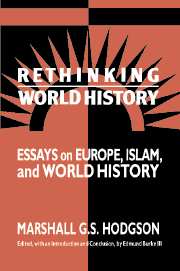Book contents
- Frontmatter
- Contents
- Editor's preface
- Introduction: Marshall G. S. Hodgson and world history
- Part I Europe in a global context
- Part II Islam in a global context
- Part III The discipline of world history
- 11 The objectivity of large-scale historical inquiry: Its peculiar limits and requirements
- 12 Conditions of historical comparison among ages and regions: The limitations of their validity
- 13 Interregional studies as integrating the historical disciplines: The practical implications of an interregional orientation for scholars and for the public
- Conclusion: Islamic history as world history: Marshall G.S. Hodgson and The Venture of Islam
11 - The objectivity of large-scale historical inquiry: Its peculiar limits and requirements
Published online by Cambridge University Press: 18 December 2009
- Frontmatter
- Contents
- Editor's preface
- Introduction: Marshall G. S. Hodgson and world history
- Part I Europe in a global context
- Part II Islam in a global context
- Part III The discipline of world history
- 11 The objectivity of large-scale historical inquiry: Its peculiar limits and requirements
- 12 Conditions of historical comparison among ages and regions: The limitations of their validity
- 13 Interregional studies as integrating the historical disciplines: The practical implications of an interregional orientation for scholars and for the public
- Conclusion: Islamic history as world history: Marshall G.S. Hodgson and The Venture of Islam
Summary
To this point, we have been analyzing various relatively particular historical movements from a world-historical point of view. But this sort of search has led us repeatedly into problems touching the nature of historical inquiry generally. It is not, in fact, surprising that the introduction of a genuinely world-historical viewpoint is likely to have repercussions in almost all aspects of historical thinking. In this final section we shall see that interregional history does indeed require its own types of historical thinking; but we shall go further. We shall suggest that the types of thinking required for it are not merely a special case of historical research. They are central to the historical disciplines as an autonomous field of public inquiry. From one important point of view, world history, interpreted as interregional history, must form the core of the intellectual organization of the historical profession.
Despite the enormous amount of research already accomplished, our historical knowledge is still far from meeting the demands we make on it as we try to form and criticize our vision of mankind. It is already a large order, that we want to know our own immediate background and how it has formed us, and to know the past of greatly differing peoples so as to expand our sympathies. These piecemeal interests already carry us round the world and back; and it has so far taxed historical ingenuity and imagination, how to provide insight which is at once so wide-ranging in scope and yet humanly meaningful in detail – as against the typical textbook or survey.
- Type
- Chapter
- Information
- Rethinking World HistoryEssays on Europe, Islam and World History, pp. 247 - 266Publisher: Cambridge University PressPrint publication year: 1993

